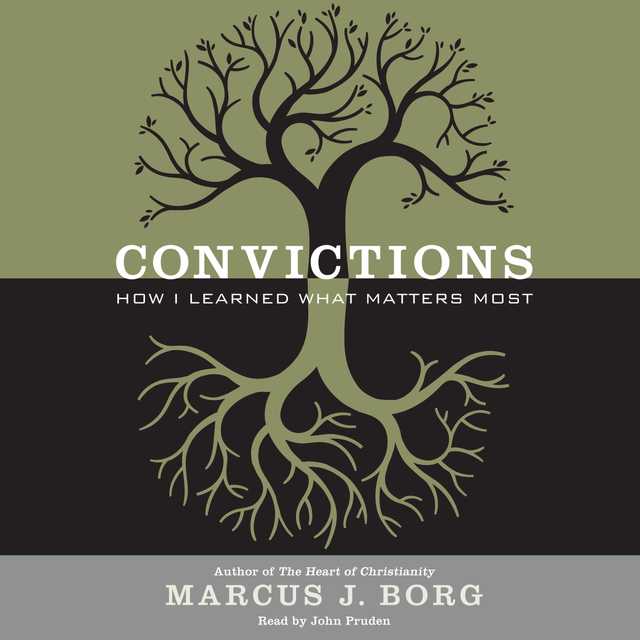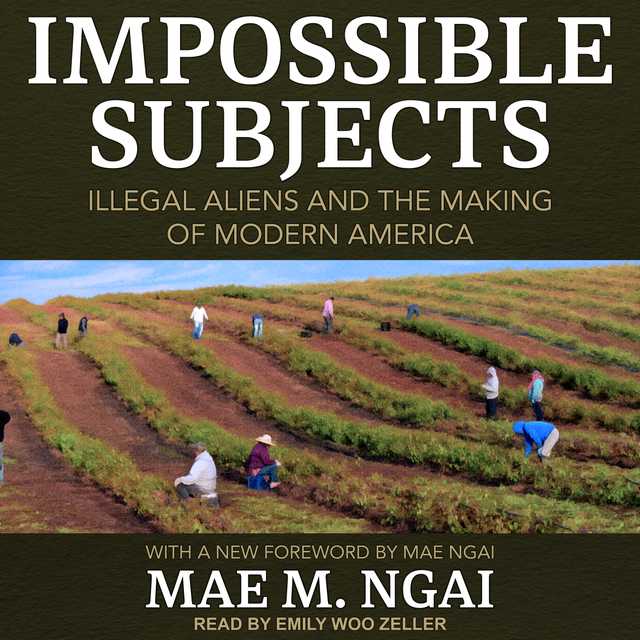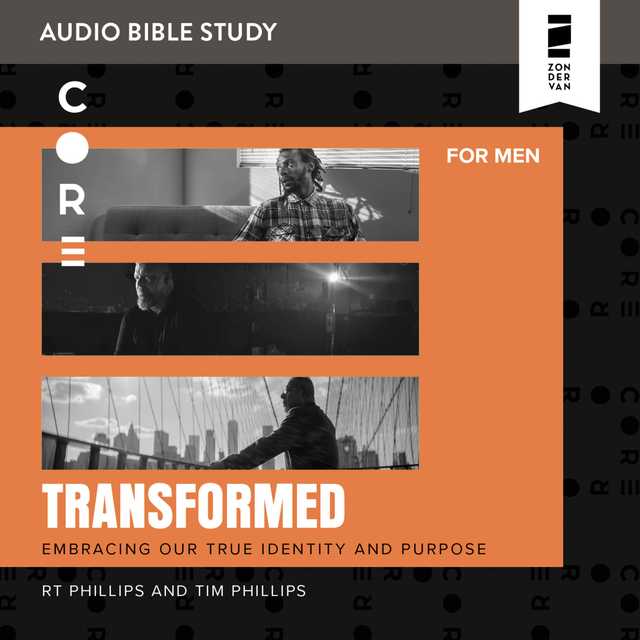Convictions Audiobook Summary
On the occasion of his seventieth birthday, the renowned scholar Marcus J. Borg shares how he formed his bedrock religious beliefs, contending that Christians in America are at their best when they focus on hope and transformation and so shows how we can return to what really matters most. The result is a manifesto for all progressive Christians who seek the best path for following Jesus today.
With each chapter embodying a distinct conviction, Borg writes provocatively and compellingly on the beliefs that can deeply ground us and guide us, such as: God is real and a mystery; salvation is more about this life than an afterlife; the Bible can be true without being literally true; Jesus’s death on the cross matters–but not because he paid for our sins; God is passionate about justice and the poor; and to love God is to love like God.
Borg calls all American Christians to reject divisiveness and exclusivity and create communities that celebrate joy, possibility, and renewal. Throughout, he reflects on what matters most, bringing to earth the kingdom of God Jesus talked about and transforming our relationships with one another. Rich in wisdom and insight, Convictions is sure to become a classic of contemporary Christianity.
Other Top Audiobooks
Convictions Audiobook Narrator
John Pruden is the narrator of Convictions audiobook that was written by Marcus J. Borg
Marcus J. Borg (1942-2015) was a pioneering author and teacher whom the New York Times described as “a leading figure in his generation of Jesus scholars.” He was the Hundere Distinguished Professor of Religion and Culture at Oregon State University and canon theologian at Trinity Episcopal Cathedral in Portland, and he appeared on NBC’s The Today Show and Dateline, ABC’s World News, and NPR’s Fresh Air. His books have sold over a million copies, including the bestselling Meeting Jesus Again for the First Time, Reading the Bible Again for the First Time, Jesus, The Heart of Christianity, Evolution of the Word, Speaking Christian, and Convictions.
About the Author(s) of Convictions
Marcus J. Borg is the author of Convictions
More From the Same
- Author : Marcus J. Borg
- Jesus
- The First Paul
- Days of Awe and Wonder
- The First Christmas
- Reading the Bible Again for the First Time
- Publisher : HarperAudio
- Abraham
- American Gods [TV Tie-In]
- Dead Ringer
- House of Sand and Fog
- Prey
Convictions Full Details
| Narrator | John Pruden |
| Length | 6 hours 11 minutes |
| Author | Marcus J. Borg |
| Category | |
| Publisher | HarperAudio |
| Release date | May 20, 2014 |
| ISBN | 9780062331946 |
Subjects
The publisher of the Convictions is HarperAudio. includes the following subjects: The BISAC Subject Code is Christian Church, History, Religion
Additional info
The publisher of the Convictions is HarperAudio. The imprint is HarperAudio. It is supplied by HarperAudio. The ISBN-13 is 9780062331946.
Global Availability
This book is only available in the United States.
Goodreads Reviews
Trey
October 02, 2014
I struggle to think of one writer that embodies my belief system any better than Marcus Borg. Often throughout life, I've found it difficult to find those that have the same responses, but Borg for me is a breath of fresh air. I usually agree with 95% of what he says and think he has the heart of the message Jesus had in mind with every word typed in his books. I feel his work is the perfect bridge between atheism and Christianity, where most of his views could be accepted by both sides of rational minded people. Borg speaks a lot in this book about how his life came to where it is 70 years later, discussing his early years in Christianity to his pre-college understanding of Christianity, to his decision to switch his major and become one of the greatest biblical scholars of the 20th and 21st centuries. He focuses on what the ministry of Jesus meant in the present as "The Kingdom Of God" on Earth, not just that of Heaven and an after-life. He makes mention of how Jesus meant more than a blood sacrifice with how people view Him today. He speaks a lot about how Jesus is the norm of what we are to be like, and if the Bible is in disagreement with Jesus, trust Jesus and not the Bible. He discusses how the Bible is not literally true always, where historical-metaphorical-parabolic interpretation is the way to view the Bible. Borg insists the message of Jesus and of many biblical books is focused on a political aspect, where God is passionate about His people helping the poor and bringing social justice to the Kingdom here on Earth. Christians are called to not pursue war and violence against others, challenging our country and thoughts of those living in the USA. His ultimate message is that God is a God of love, no matter how writers may depict God in any setting or justify any war. Recommended for everyone that has an interest in religion or making our planet a better place!
Jt
June 10, 2022
This is not a book I would normally pick up to read. I was raised in a rigid and dark Catholic home. I stopped going to church the year I moved out of my parents' house and never planned to come back to it. Later in my life, I came to see that the harsh hand of Catholicism as it was practiced in my home served mostly to push me away from all things spiritual/religious. I decided I wanted to cautiously revisit some of that stuff from childhood. A friend recommended Borg's book and I found it to be a curious and readable guide. Convictions: How I Learned What Matters Most is both memoir and informative text. Borg uses his own story to reveal his path to progressive Christianity as well as to illuminate some of the history and shifts in direction that Christianity has undergone over the years. In the opening chapter he delightfully focuses on gratitude saying, "At seventy, I primarily feel gratitude. Each extra day feels like ...the cherry on top of the whipped cream on top of the hot fudge on top of the ice cream. I enjoy my days more than I ever have. At seventy, life is too short to spend even an hour feeling preoccupied or grumpy or out of sorts." Touché. Love it. I could stop reading right there and know that the book had already had meaning for me. Borg is an engaging and unpretentious author. His language is down to earth and his examples and illustrations make sense. Early in the book, he includes an interesting discussion of divisions among organized religions (in particular the evolution of Christianity). Additionally, he describes five categories of Christianity and, to some extent, how they interact. Over the course of the book, he shows how his conservative childhood faith evolved into a more complete, more tolerant, more affirming faith. I very much appreciate his acknowledgment that Christianity does not have a monopoly on God or religion. Progressive Christians believe that "the way" that Jesus revealed is also present in other enduring religious traditions. Borg devotes attention to a discussion of Biblical truth and dispels some of the literal notions held by more conservative Christians. He lost me a bit with his discussion about why Jesus's death on the cross matters. I still don't get it but, in the grand scheme of things, I don't have to get it. Borg also focuses a bit on the politics of religion. He gives a big nod to the role of Christians in social justice issues and in the need for peace and nonviolence movements. In much the same way that the opening chapter got to me with Borg's delight in his days , his final chapter got me with his warm review of what it means to love God. Ha! That's why I came to the book. I am trying to figure out a) who is this God thing and b) why would I love it? and c) if I were going to love it, then what does that even look like? The whole idea feels so foreign and incomprehensible to me. The last chapter considers what it means to love God. From his description, it appears that Marcus Borg and I had the same introduction to God: we were to fear God. Fearing God, from a child's perspective, is preparing yourself for punishment. It was as if God said to us, "I love you - and I expect good behavior from you, and if you don't meet my requirements, I will punish you." Yup. But Borg writes a very different description of God and love in that final chapter.God is warm, tender, attractive, beloved. Okay, that doesn't mean I can fully buy this idea of God but it is hella more likely that I would gravitate to this notion of God than to the punitive and scary God of my childhood.More reading, more conversation, more experimenting required but thank you to Marcus Borg for his thoughtful and clear introduction to his God. Borg died about a year after this book was published. Somehow that adds some poignancy to everything he wrote. Now he knows the truth.
Raymond
July 25, 2018
Borg's book is about his evolution into a progressive Christian and what that means to him. Borg described his childhood as being raised in a more fundamentalist tradition and that over time he let certain tenets go. In his book he focuses on how some Biblical stories should be taken metaphorically rather than literally, how salvation is more about the transformation in this life, and the importance of helping the poor and promoting nonviolence in our chaotic world. He also makes the argument that early Christianity and the Eastern Orthodox Church is more in line with this thinking. I actually had the privilege to hear Borg speak almost 10 years ago when I was in college. He was a well written theologian whose work is understandable to a general audience.
Lisa
July 04, 2018
This would not be a book that I would typically gravitate toward. I came to it because I am doing research on community building and much is written on the topic in progressive Christian communities. His views are familiar to me, having grown up in the peace and justice movement as a child. The book is laid out in a way that is part memoir (his own journey of faith) and part argument for interpretations of the Bible that are Jesus-centered (and more in line with science and empirical reflection). It's great to see that Marcus Borg is attracting an appreciative audience today because we certainly need advocates from all compassionate and contemplative traditions.If you are Christian and seeking an inspiring book, or someone who enjoys reading varied contemplative traditions, you could value reading this book.
Sierra
December 23, 2015
My parents gave this to me after reading it with a study group at their church. It's my third Marcus Borg book. I read his book dissecting whether anything in the Bible was actually said by Jesus in a class on "The Historical Jesus" in college, as well as "The Heart of Christianity," also a gift from my parents. This one resonated far more with me. After a long lifetime of scholarship, Borg finally gets very personal and very to the point. It's refreshing to see him take a stand.Whatever your own personal beliefs, this book is a touching look at one man's life in Christianity and academia and his struggle to define what he believes. It's also a very clear and succinct description of the profound differences between conservative/fundamentalist and progressive christianity. A short and engrossing read.
Kate
June 23, 2014
I deeply appreciate Marcus Borg's efforts to put progressive Christianity into a theological context that is accessible to the lay reader. He really cares about the average mainline church goer and giving them language and rationale for their beliefs. There is a lot that lay people cannot articulate about what they believe and why they believe the way they do. Marcus Borg lays it all out so it's understandable and organized. At least he lays HIS perspective out in such a way. In this book, you'll get solid grounding for why we need to take the Bible seriously, but not literally, among other things. You'll learn new ways to think about resurrection. You'll think differently, perhaps, about the focus on the afterlife. All in all, a wonderful guide to those who are perplexed about mainline Christianity. Fills in the gaps that sunday school left open.
Truman
June 07, 2014
This book, written by a lifelong biblical scholar, teacher, and theologian, means a great deal to me, and I use the present tense because I will read in it more in time to come. Written in a very plain and forgiveably simplistic style, Marcus Borgoffers progressive Christians like himself a wonderful way to move away from thedeadly "terms of belief" discussion to a life-enhancing way of living in the Christian community and in a more honest personal relationship with Christ. Evangelicals,Literalists, and Fundamentalists have other books to enlighten them. Great! This one is for folks like me, and just maybe - you.
Erin
November 18, 2015
Marcus Borg explains his spiritual journey toward "progressive" Christianity, and along the way provides a fabulous primer of what many progressive Christians believe and why.
Monica
March 23, 2018
This book really changed what I believed Christianity to be. I highly recommended this for anyone who either identifies as a Christian, or simply wants to learn more about the religion and its history.
Eugenea
October 09, 2017
Read as a Sunday School text, this book turned out to be very accessible and a pleasure to discuss with others. It is part autobiography and part progressive Christian theology. Well done.
Neil
April 12, 2021
I have heard the author speak to Christian church groups, in several You Tube videos. I find his speaking style to be very appealing - logical, well-organized, accessible, and rich with insight and meaning. In short, he has something worth saying, and he says it very well. At the center of his message is a mixture of elements: years of scholarly preparation, a life of reflective thought, and habits of simple decency. So I was interested in his book, which grew from a talk he gave on the occasion of his 70th birthday, several years ago. In this book, Borg starts with memories of his family life and younger years in the upper midwest, and the ideas he had then of what the Gospel was about. He goes on to describe the changes in his thinking in early adulthood - mainly a loss of faith - and how subsequently he underwent a conversion, triggered in part by unexpected mystical experiences, which he interpreted as signs of "something more" than the world as we normally perceive it. He goes on, in a third section, to speak of his convictions - deeply founded ideas about the nature of God and what God desires passionately for us to be and to do. Along the way, Borg takes some time to offer observations on the current state of American Christianity, which he divides in conservative and progressive camps, with a third camp of folks in between, who seem to lean progressive but aren't quite sure. Borg himself is a progressive, and he talks about the powerful eye-opening effect of reading the Book of Amos in college, in which God makes it clear that he is not in favor of dominance systems in which the powerful rich exploit the powerless poor, grinding them into the dirt. A key reference to make the point clear, from Ch 8 (King James version):4 Hear this, O ye that swallow up the needy, even to make the poor of the land to fail,5 Saying, When will the new moon be gone, that we may sell corn? and the sabbath, that we may set forth wheat, making the ephah small, and the shekel great, and falsifying the balances by deceit?6 That we may buy the poor for silver, and the needy for a pair of shoes; yea, and sell the refuse of the wheat?He has a lot to say about Jesus, too. Jesus didn't die for your sins. God didn't demand the death of his sons in exchange for our salvation. Eternal life, in Heaven or Hell, was not really the point. None of that is why Jesus came into the world, according to Borg. His (Jesus's) central message was that the kingdom of God, "on Earth as it is in Heaven", was at hand - that God desired transformation of the this world and of us, here and now. How would we be transformed? We would become much more merciful and compassionate towards one another - not merely those in our families or our immediate social circle, and not merely those who could return the favor of our kindness and generosity, but also our enemies and the poor. This is how God is, and how we must be, a message found throughout the Old and New Testament, as here in Luke Ch 6 (ESV): 35 But love your enemies, and do good, and lend, expecting nothing in return, and your reward will be great, and you will be sons of the Most High, for he is kind to the ungrateful and the evil. 36 Be merciful, even as your Father is merciful.I would like to have had a chance to speak with Borg. I would like to have asked him to help me reconcile my impression of him as intelligent, thoughtful, and committed to ethical Christianity, with what appears to me to be a fundamental dishonesty. On one hand, he says in this book that when some of his students tell him they do not believe in God, he asks them to describe the God in whom they do not believe. His point is that we need not believe in God as a great father in the sky, or even as an anthropomorphic being at all. We should understand God as someone or even something more transcendent and ineffable - beyond our ability to describe in words. Kind of like the Force, if you remember Luke Skywalker. Then how does one assert that God passionately desires that we love one another, or that God wants us to transform our political and economic systems away from domination and exploitation (and environmental / climate ruination)? This seems to me to be a very admirable idea of who / what God is, but also very specific and intentional for something so ineffable and transcendent. I have tried to reconcile these very different concepts and it keeps leading me back to the suspicion that Borg is not being completely honest with us. In this, he reminds me of many other believers, who believe God is all-loving and good, that God has desires and intentions, that God's intentions and desires are revealed in sacred scripture, and that God acts in this world to advance his intentions and desires in a powerful and transformative way (as, for example, through the ministry of Jesus and other prophets), and yet object to the secular critique of these and other more vulnerable religious beliefs by hiding behind the ineffability defense, as if they believed in a completely transcendent God about whom it was not possible to offer any testable descriptions or affirmations, a concept beyond our science or rationality or even our imagination. Yet somehow we know such a God wishes we would love one another? In the same way, Borg relies quite heavily on his reading of Scripture, although he is critical of those who hold to the inerrancy doctrine, or to those who cling to the text in one part of Scripture even when it is in conflict with the words and example of Jesus elsewhere in the text. But when Borg reads the Book of Amos, it changes his world view for the rest of his life. In the text, he finds the key to understanding God's nature and most passionate desire. God wants justice for the poor. How does one know when Scripture is correct? Compare the text with Jesus, the norm, and if it fits, it is correct. Amos and Jesus are aligned, so Amos is good Scripture. I get it, and yet I cannot help pointing out that the Jesus he knows is also a product of Scripture. By this I mean that those who tell us of Jesus in the New Testament were also readers of Scripture - how confident are we that our account of his teaching and of his arrest and execution, let alone the Easter claims, are sufficiently accurate? If these descriptions were themselves influenced in substantial ways by other sacred texts, can our understanding of Jesus from the Gospels be a useful test of the reliability of those texts? In fairness to Borg, I think this idea that Jesus is the "norm of the Bible" is critically important to avoid really miserable misunderstandings of Scripture. But as in the argument he makes for believing in God, his argument for believing in Scripture is also not clearly or well supported. Perhaps I should allow for the possibility that Borg is writing for an audience of believers for whom the existence of God and the essential truth (if not factual veracity) of sacred Scripture as a whole is an accepted premise. Still, if he were alive today and had any interest in such a conversation, I would ask him to defend these premises.Here is what I think after reading his book and having listened to him speak. On one hand, Borg was conditioned by his upbringing to respect religion. Even after losing his faith, he retained a deep-seated sense of the goodness of reverence and humility, and an openness to a spiritual experience and a spiritual awareness of the world. This resonates with my own experience; perhaps it fits Borg. In any case, he has a mystical experience that opens his mind to the possibility that there is more to this world than we normally experience in our daily mundane experience. LSD experimentation produces a similar insight in some people, but in Borg's case, sitting in his car, alone, on a drive through the country, he suddenly notices the whole world glowing all around him. Luminous and numinous, the experience (and possibly one or two others) shook his unbelief and provoked a conversion. God is out there, after all. All around him, and profoundly beautiful and good. Perhaps it is not unreasonable to experience such beauty and to impute goodness to it, and if such a bounteous goodness surrounds us and infuses us, it must be in our nature to be good. This "something more" as Borg understands it, is the spirit of God. This "something more" soaks and envelops and illumines all of existence, womblike, nurturing, and wishing for our transformation - our alignment with its own nature. God's own nature. Be merciful as God is merciful. Love God and love what God loves. And God loves all of Creation. These are among Borg's core convictions - fundamental approaches to the world more than mere beliefs. They are not completely irrational, but they are, I think, primarily the product of experience and inspiration. They have such apparent personal truth for Borg, and seem to me eminently admirable insights. There is an amiable wisdom in Borg.As a non-believer, living in an overtly and somewhat belligerently Christian America, I sometimes wonder if progressive Christians like Borg (and Barack Obama, for another example) pretend to believe in order to have credibility and influence within the Christian community. Borg can write about Jesus for Christian readers, and explain Jesus to them, in such a way that they can see that exploitation and domination is wrong, that we not only must do charity personally, but also collectively, and be merciful as God is merciful, but also that we must transform society and our governance and economic structures to reflect a commitment to God's passionate love for all of Creation. We must make our society and our world reflect God's all-nurturing desire for boundless compassion and justice. It is a lot easier to make this case from within the Christian community, and to root that case in Scripture. So I cannot help but wonder, sometimes.This is one of my longest reviews, so it goes without saying that I found Borg's writing to be thought-provoking (word-provoking, at the very least). If there is any hope of saving America from its belligerent racism, gross inequality, and runaway capitalism, that hope must reside in progressive Christianity, or in some future evolution of society once the dominant and toxic "white" demographic recedes into the minority. I don't think there is much reason to be hopeful before then, to be completely honest. But I am grateful for people like Borg, and for books like this one, for reminding Christians that it doesn't have to be like this.
Stephen
April 05, 2020
An incredibly honest and thought provoking book. While I don’t agree with all the Borg writes, I am grateful for his ability to challenge the presuppositions I bring to faith.
Lyn Richards
May 09, 2022
open mind requiredAs a person who desires to follow Christ, I have become disillusioned with evangelicals and their political choke hold on our country and the definition of what it means to be Christian. I dissent. This book affirms me. I gave it four stars because some of it was difficult to grasp. But I recommend it to those who question the conservative box of American evangelicals.
Bob
June 25, 2014
“Spiritual Leader” is a title I would definitely award to Marcus Borg. In describing how he emerged from a moderately conservative Lutheran upbringing into his present and somewhat unique theology, Dr. Borg preaches a stimulating sermon on “salvation”. He uses biblical citations to deny the idea of an afterlife and describe how the Kingdom of God should be right here on earth. I can well relate to his feeling that, “… my intense intellectual interest has been combined with a passion for communicating what my study - what I have learned- might mean for Christians in our time and place.” Dr. Borg suggests that the true meaning of the gospels relates to social and economic equality, freedom and justice, non-violence, etc., items he refers to collectively as “salvation”. Salvation is for people here and now, not in an afterlife, in which Dr. Borg refuses to believe. God is here and lives in each of us (panentheism).Of course, one must tolerate a few historical glitches. e.g. Dr. Borg says that Western Christians during the Fourth Crusade attacked the Eastern Christians of Constantinople because Eastern Christians “were seen as infidels and thus ‘enemies of God’ “. Actually many accounts indicate that the Western crusaders cut a deal with the Venetians who had problems with Constantinople.I also relate to his discussion of “gratitude”. Dr. Borg says, “None of us created ourselves." “... even our ability to work hard is also a gift. For those who have prospered in this life, gratitude is the awareness that we did not do it by ourselves”.Dr. Borg closes with, “What’s it all about? What’s the Christian life all about? It’s about loving God and loving what God loves. It’s about becoming passionate about God and participating in God’s passion for a different kind of world, here and now.”His explanation of what it means to love God is particularly stimulating.
Robert
November 19, 2014
Once again Marcus Borg did not disappoint. Written in a very personal tone, this little book explains (and justifies) why, when and how Marcus Borg became the progressive, unencumbered authority and Jesus scholar he is. True to his usual approach, Dr. Borg does not aim to proselytize the reader to his way of thinking, rather explains why he cannot accept the more traditional understandings offered by many other scholars in favor of his own reading and understanding. He makes clear that his understandings are dynamic not set n the stone of their inception and that reading and understanding the Biblical underpinnings of Christian theology demands the seeker to embrace the context of the time of the writer. Only with a grasp of that context can the text becaome alive in the culture we live in today,.
Frequently asked questions
Listening to audiobooks not only easy, it is also very convenient. You can listen to audiobooks on almost every device. From your laptop to your smart phone or even a smart speaker like Apple HomePod or even Alexa. Here’s how you can get started listening to audiobooks.
- 1. Download your favorite audiobook app such as Speechify.
- 2. Sign up for an account.
- 3. Browse the library for the best audiobooks and select the first one for free
- 4. Download the audiobook file to your device
- 5. Open the Speechify audiobook app and select the audiobook you want to listen to.
- 6. Adjust the playback speed and other settings to your preference.
- 7. Press play and enjoy!
While you can listen to the bestsellers on almost any device, and preferences may vary, generally smart phones are offer the most convenience factor. You could be working out, grocery shopping, or even watching your dog in the dog park on a Saturday morning.
However, most audiobook apps work across multiple devices so you can pick up that riveting new Stephen King book you started at the dog park, back on your laptop when you get back home.
Speechify is one of the best apps for audiobooks. The pricing structure is the most competitive in the market and the app is easy to use. It features the best sellers and award winning authors. Listen to your favorite books or discover new ones and listen to real voice actors read to you. Getting started is easy, the first book is free.
Research showcasing the brain health benefits of reading on a regular basis is wide-ranging and undeniable. However, research comparing the benefits of reading vs listening is much more sparse. According to professor of psychology and author Dr. Kristen Willeumier, though, there is good reason to believe that the reading experience provided by audiobooks offers many of the same brain benefits as reading a physical book.
Audiobooks are recordings of books that are read aloud by a professional voice actor. The recordings are typically available for purchase and download in digital formats such as MP3, WMA, or AAC. They can also be streamed from online services like Speechify, Audible, AppleBooks, or Spotify.
You simply download the app onto your smart phone, create your account, and in Speechify, you can choose your first book, from our vast library of best-sellers and classics, to read for free.
Audiobooks, like real books can add up over time. Here’s where you can listen to audiobooks for free. Speechify let’s you read your first best seller for free. Apart from that, we have a vast selection of free audiobooks that you can enjoy. Get the same rich experience no matter if the book was free or not.
It depends. Yes, there are free audiobooks and paid audiobooks. Speechify offers a blend of both!
It varies. The easiest way depends on a few things. The app and service you use, which device, and platform. Speechify is the easiest way to listen to audiobooks. Downloading the app is quick. It is not a large app and does not eat up space on your iPhone or Android device.
Listening to audiobooks on your smart phone, with Speechify, is the easiest way to listen to audiobooks.






























